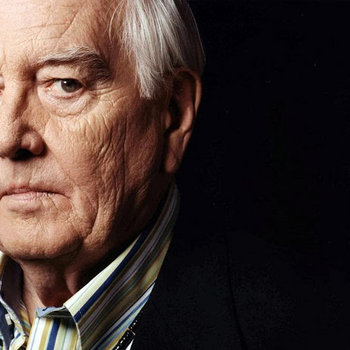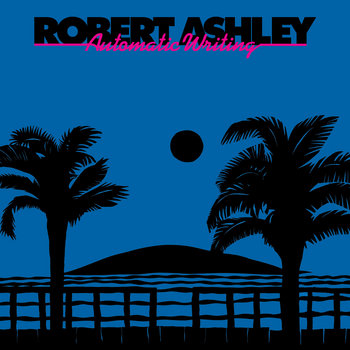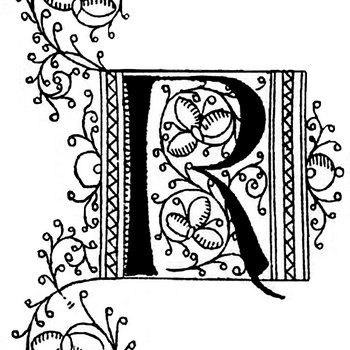
One of the things about new ideas is that they’re usually not all that new. It’s the present that can seem old and stale, and bringing in things from the past can help revive things. Not that the great opera composer Robert Ashley wasn’t at the far edge of the avant-garde; it’s just that his foundational idea, communicating drama through the language of his times, is also the foundation of opera in Western classical music.
Ashley’s operas, like all operas, have singers performing as characters and music that underscores drama. Plain and simple, then—but in the extreme; Ashley’s idea of singing was mostly gently intoned speech (with some singing) precisely timed to fit into discrete blocks of seconds, and his orchestra was usually an almost subliminal bed of ambient sounds that defined basic harmonies and waxed and waned with the story. His stagings were equally simple, with the performers sitting, usually at desks, and usually not even in costume. The text, delivered musically, is the thing.
And what text! Ashley was one of the great American writers, and his operas make a strong argument for being the elusive Great American Novel, with their stories of ordinary people speaking in everyday language (Ashley did publish a novel, the marvelous tongue-in-cheek international spy thriller Quicksand). His work is at the center of both the American experience and his partner Mimi Johnson’s Lovely Music label, the most important chronicler of late 20th-century American experimentalism.
Automatic Writing



Vinyl LP

The quasi-ASMR sound of Ashley’s opera has a somatic origin, which was Ashley’s experience of his own speech. He felt he had Tourette’s Syndrome, that words came out involuntarily. Automatic Writing is an audio experiment with that. One summer day he set up a microphone in a studio at Mills College and recorded whatever came in, seeking to capture his own involuntary speech. Something like intentional electronic voice phenomenon, the piece has an alluring ambience, a time-stopping pace, the feeling that things are emerging.
Perfect Lives
Ashley made Perfect Lives for a medium he loved and thought was the future of opera: Television. Ashley was interested in the American vernacular, in language and music, and in how we sound speaking to each other and talking to ourselves, and the intimate space of the television screen was ideal for the natural, plainspoken quality of his internal monologues. Perfect Lives premiered on British television in 1983 and has the themes that occupied Ashley’s work for decades, including the ennui of aging, the elusiveness of understanding and self-knowledge, the metaphysics of the afterlife. Does that seem heavy? Not when everything is encased in Ashley’s pitch-perfect Midwestern warmth and amiableness.
Dust
In the context of operas, Ashley’s characters are marginal because they’re just ordinary people with everyday thoughts. In Dust, that goes even further; the characters were inspired by the unhoused people who lived in and around Tribeca Park, across the street from Ashley’s home. The voices here are people on the margins of society everywhere, their memories and their tragedy, including the veteran in “No Legs,” who spoke with God when full of heroin, to relieve his pain from a horrible wound.
Celestial Excursions
Ashley’s operas are profoundly personal. They came from his concerns about the basics of his own life and what he saw around him. He made the ordinary extraordinarily vivid; Celestial Excursions begins with the statement that, “A group of so-called fictitious characters is just as bad as a group of so-called real ones … they fight among themselves and have affairs that are kept secret.” The people here are again marginal—in this case because they are old. This was the essence of Ashley’s late work, contemplating his own aging, how it effected his life emotionally and physically, the feeling of being trapped in the limitations of a decaying body with time running out. The charm of his music barely hides how moving this is.
Thomas Buckner
Spontaneous Musical Invention








2 x Vinyl LP, Compact Disc (CD)




Ashley’s method was so unique that, like other avant-garde composers of the 20th century, he needed a small group of special performers who understood what he was doing and wanted to be part of it. Foremost in his “first band” was baritone Thomas Buckner, one of the most important vocalists in new music of the last 50-plus years. This great collection contains some of Ashley’s songs—in this case, small scale solo works that often move out of speech into melodies, performed by Buckner. Like opera composers before him, some of the music is distilled from a larger piece, while the final two pieces are previously unpublished stand-alone musical stories.
Crash


Ashley’s final opera, Crash premiered at the Whitney Museum just after his death—Ashley supervised the rehearsals as much as he could during the last stages of illness. The premiere, and this recording, are also important because they debuted this “second band,” a group of vocalists and theater performers—Gelsey Bell, Paul Pinto, Amirtha Kidambi, Brian McCorkle, Dave Ruder, and Aliza Simons—a new generation of performers taking over from the previous one and keeping the Ashley flame alive. They are excellent, falling easily into the balance of discipline and naturalness that the music needs. Crash is also a summation of Ashley, his technique both stripped down and sumptuous, the story a complex and deeply touching intertwined biography of several characters, each trying to remember their pasts late in life.







